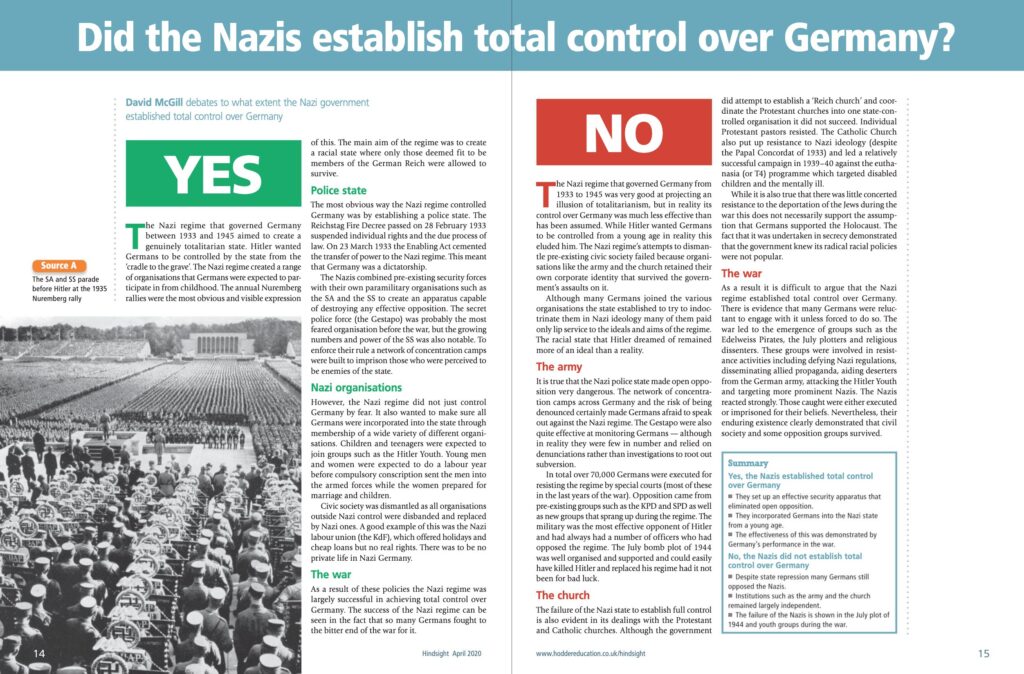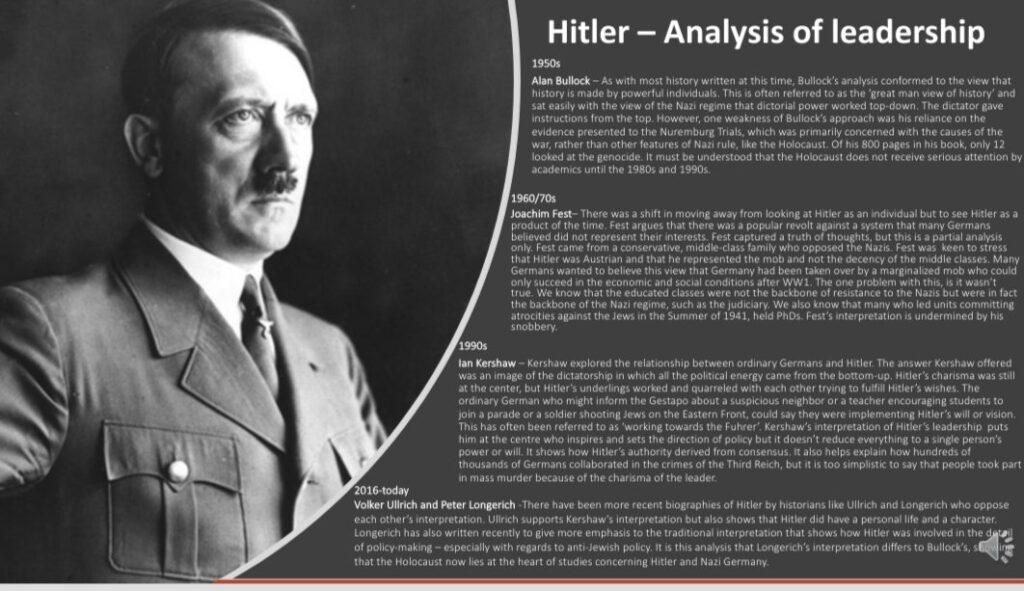When arguing Hitler’s consolidation of power, ensure you distinguish between this and his maintenance of power. There is no consensus on when one ends and the other begins so it is left up to you. However, my advice is that you use the period from February 1933 to August 1934, when Hitler combines the roles of chancellor and president.
1933 February, the Reichstag burns down. Hitler persuades Hindenburg to pass the Reichstag Fire Decree.
1933 March, the first concentration camp at Dachau opens. The Enabling Act is also passed.
1933 April, the Communist Party is banned.
1933 The Concordat with the Roman Catholic Church is signed.
1934 April, Hermann Goering forms the Gestapo with Heinrich Himmler taking charge.
1934 June/July, The Night of the Long Knives. Rohm and other SA leaders were arrested and some executed for treason.
1934 August, President Hindenburg dies and Hitler assumes the role, becoming dictator of Germany.
1935 The Nuremberg Laws are passed, alienating the Jews from German society.
1936 September, Goering begins the Four-Year Plans. Schacht loses some of his influence on the economy.
1936 November, Anti-Comintern Pact between Germany and Italy.
1937 Japan joins the Anti-Comintern Pact
1938 September, the Munich Agreement is signed.
1938 November, the German diplomat Ernst vom Rath is killed by a Jewish youth and Goebels and Hitler uses the event to launch Kristallnacht.
1939 March, Hitler breaks the Munich Agreement and takes all of Czechoslovakia.
1939 August, Germany and the USSR sign the Nazi-Soviet Pact.
1939 September, Germany invades Poland, triggering the Second World War in Europe
Consolidation and Maintainance of Power
There are different theories of who was responsible for the Reichstag Fire. As the Nazis used it for their own propaganda purposes, it can be argued that they started it and blamed a communist sympathiser. Indeed, Goering is reported as saying years later that he had planned the arson. However, Richard Evans disagrees, explaining that Van Der Lubbe had tried to set three previous buildings on fire and failed. With the Reichstag, he did not.

Force and Terror
Hitler passed legislation to make him more powerful as soon as he became chancellor. He used force and persuasion to do this.
The Enabling Act: Hitler Seizes Absolute Power
A continuing debate for Nazi Germany scholars is whether the society helped Hitler carry out his ideological policies or he used force and terror to implement them. This article below is one viewpoint from Richard Evans, a superb perspective to use in any essay.
Coercion and Consent in Nazi Germany
Q. What does the following story about Nazi Germany tell you about the maintenance of power?

Propaganda
The Eternal Jew was both a poster and a movie-documentary produced in Nazi Germany. They were produced to reinforce the anti-semitic message across Nazi-occupied Germany.
BBC explanation of the ‘Eternal Jew Exhibition’

Night of the Long Knives
Foreign Policy
Be wary of focusing on land outside Germany’s former borders. The consolidation of power should focus on Hitler’s domestic policies.
Perspectives and Historiography
Richard Evans argues that Nazi repression, exercised through the Gestapo and concentration camps, was on a small scale and did not affect the majority of the population. The regime was generally popular with the polls and elections being evidence of this. The population was happy to denounce enemies and knew of the existence of concentration camps, acknowledging their usefulness. Moreover, there was no doubt that Germans knew of what was later called the Holocaust. He further argues that there was a consensus after the Second World War that Nazi Germany was a ‘police state’ – this was the ‘intentionalist’ school of thought.
Richard Evans argues that the purpose of Nazi propaganda was for obedience rather than persuasion.
Obstacles to Hitler becoming dictator (intentionalist)
Factors which may help Hitler become a dictator (structuralist/functionalist)
Further Resources
How did the Nazi consolidate their power?
Aims and Results of Policies
Perspectives
Ian Kershaw explained that Hitler was meant to be seen as the all-powerful, all-knowing leader, who prevailed over a system of total order, but the contrast between image and reality was a stark one. Far from it being a very orderly structure of command, in fact it was very disorganised and rather chaotic. It really is quite a remarkable system, if you can call it a system at all, where there is no collective government but yet where the head of state actually doesn’t spend all his time dictating. He also explained that German society was mostly to blame for Hitler’s maintenance of power. The important organisations and people of the country kept him in power. In fact, Kershaw argues that in a different decade Hitler would not have held power in the country. As a result, he belongs in the structuralist/ functionalist school of thought.
Karl Bracher agreed with Kershaw in that Germany was governed chaotically. This actually helped him rule over his party and the country, there would be no organised resistance. Another functionalist Saul Friedlander, explains that German ‘Wagnerian’ nationalism and endemic anti-semitism enabled Hitler to become the leader and hold onto power within Germany.
John Lukacs belongs to the intentionalist school of thought. He accepts that Hitler was helped to power by German society but he had his own plans for the country and made changes as a result.
Historiography

Richard Evans
Consolidation of Power
Karl Dietrich Bracher acknowledges the Nazi state was less organised than outward appearances suggest, Bracher believes this was largely due to Hitler, who intentionally created multiple departments and encouraged competing interests. He did this to ‘divide and rule’, enhancing his own power by distracting those who might covet it. Alpha History
Ian Kershaw sees the Fuhrer as a ‘lazy dictator’ who possessed absolute power but lacked the energy or attention to use it much. Hitler did not work long hours, loathed paperwork and had no interest in overseeing projects in any detail. He was reactive and unable to produce new ideas, relying instead on advisors and acolytes in his inner circle. Alpha History
Recently, Catherine Epstein argues that,

Aims and Results of Policies
Other resources
